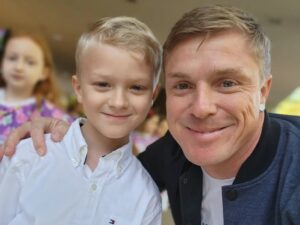Chad, 41, describes his life before sobriety as “darkness with glimmers of light.”
On top of battling addiction, Chad experienced several traumatic events, including the devastating loss of his wife in 2019. Left with two young sons and struggling with addiction, he looked into the face of his innocent 8-month-old and knew something had to change. And he knew the journey wouldn’t be easy.
Chad shares, “After my wife died, there was this part of me that felt like I wanted to die too. There was this indescribable darkness. And addiction in itself is such an incredibly dark place to be in.”
Seeking respite from the darkness, the decision to seek help brought Chad to Healing Transitions. Though he initially resisted the idea of giving Healing Transitions a try, a trusted friend challenged him to take the next step.
Upon arrival, Chad encountered fear and a tendency to compare himself to others. Chad had never experienced homelessness, and he was tempted to stigmatize others in the program. However, the welcoming atmosphere surprised him. A sense of brotherhood and love replaced his judgmental attitude. The support Chad received at Healing Transitions reinforced his decision to pursue a different path. 
Throughout his recovery journey, mentors played a crucial role. Chad mentions the influence of Chris Budnick, Executive Director of Healing Transitions, who treated Chad with compassion.
“He told me that he’d heard about my wife and how sorry he was, and he treated me like a human being. Most people weren’t treating me like a human being at that time in my life,” Chad recalls.
Today, his sons give him great joy and a reason for continuing to pursue his recovery. “My boys are the most important thing in my life. I don’t think I’d be alive without them, honestly. They gave me a reason to live and, looking at my youngest son’s face, I can still go back to that moment and the push he gave me to change. It was the most joyful highlight of my existence is being a father.”
Chad has dedicated his career to helping others by becoming a life coach, carrying many of the lessons he learned at Healing Transitions into his work today.
When asked about seeking support through programs like Healing Transitions, Chad emphasizes the importance of commitment. While initially hesitant to start the program due to its length, he recognized that the commitment to oneself is small compared to a life addicted to drugs. Healing Transitions, according to Chad, is not just a program, it creates a lifestyle tailored to an individual’s recovery, focusing on accountability and successful reintegration into society. Chad also highlights the diversity of recovery approaches at Healing Transitions, allowing individuals to choose a path that resonates with them.

“If you’re looking for a program that’s going to hold you accountable on every single level and then also help you transition to society and be successful, I think it’s the best program there is, and I’ve tried everything,” he shares encouragingly.
Chad’s transformation is incredible. His life, once marked by despair, is now described as “unbelievably beautiful.”
